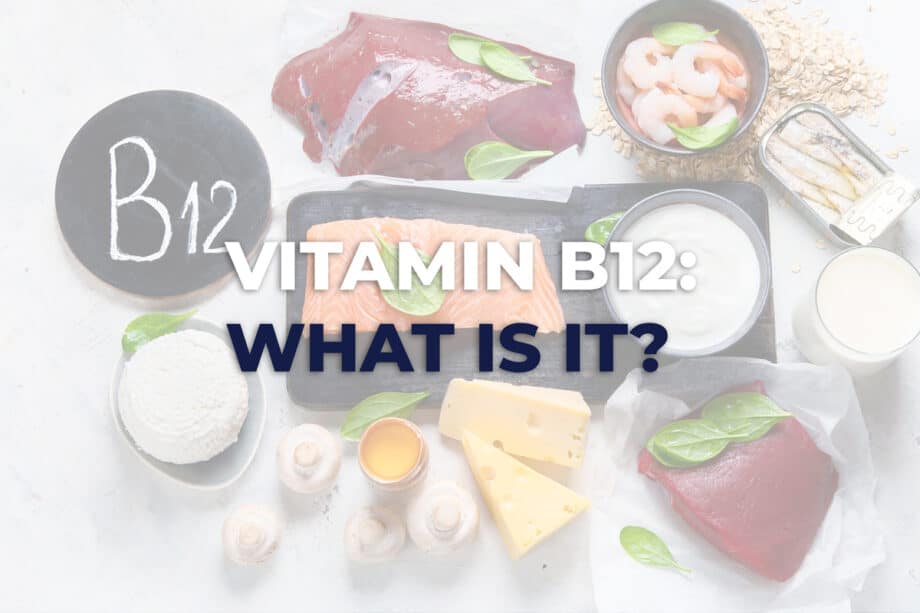While we find some vitamins in the colors of the rainbow, we find others in the animal proteins we eat. Omnivorous, whole food diets allow us to effectively consume the vitamins and minerals that sustain us. But if you follow plant-based diets, do not fret, as supplementation exists to close nutrient gaps and ensure satiation in all vital nutrients. Today we will discuss one vitamin found only in animal proteins: vitamin B12. This vitamin supports red blood cell formation, DNA formation, and the central nervous system. Keep reading to learn more!
What is Vitamin B12?
It is a fat-soluble vitamin involved in the production of red blood cells. Vitamin B12 also functions as a cofactor in cellular DNA and the central nervous system:
- Central Nervous System: required for development, myelination, and function in the CNS
- Red Blood Cells: developing red blood cells—erythroblasts—require B12 in their proliferation
- DNA Formation: functions as a cofactor, catalyzing reactions essential for DNA formation
Cofactors increase the rate of essential chemical reactions in enzyme systems. Enzyme systems break down essential nutrients—carbohydrates, fats, and proteins—to sustain our bodies. Because vitamin B12 functions as a cofactor in enzyme systems that support the central nervous system and the formation of DNA, it is vital. We want to make sure we consume sufficient amounts.
Daily Recommended Intake: B12
The National Institute of Health recommends the following for average, healthy adults.
| Daily Recommended Intake | |
| Adult Males | 2.4 micrograms/day |
| Adult Females | 2.4 micrograms/day |
| Pregnant Females | 2.6 micrograms/day |
| Breastfeeding Females | 2.8 micrograms/day |
Pregnancy often requires higher doses to support your body in sufficiency as it develops the fetus; breastfeeding often requires higher doses as you replenish vitamin stores depleted during pregnancy. You can consume this vitamin through your diet or through supplementation. Do whatever best supports your diet preferences and individual nutrient sufficiency.
Natural Sources of Vitamin B12
We can consume this food through animal-based proteins. See examples below:
- Beef
- Eggs
- Nutritional Yeast
- Salmon
- Tuna
- Turkey
- Yogurt
Omnivorous foods provide large amounts of this vitamin—primarily through milk-based products and meat. If you do not consume animal products, consider fortified alternatives e.g., fortified almond and oat milk. If you struggle to consume adequate amounts of essential vitamins in your diet, consider supplementation! Supplementation exists to close nutrient gaps. If you have concerns about your individual health as it pertains to vitamin B12 consumption, reach out to your healthcare provider!
Can I Take Too Much B12?
It is unlikely. Vitamins that are fat-soluble (A, D, E, and K) are not flushed out of the body as easily as water-soluble vitamins (B and C). Therefore, we tend to excrete any excess B12.
Does Supplement Source Matter?
In short, YES!
When supplementing vitamin B12, think about the supplement source and absorption mechanism. Some supplements appear more desirable because they offer 10x the daily recommended value, but if more product is present than needed, it does not benefit you. Your body will not absorb the excess B12. You will excrete it—inadvertently paying for expensive urine.
Seek out supplements that function on liposomal delivery systems. Liposomal delivery increases nutrient absorption by 150% when compared to traditional pill formulas. You are what you absorb!
Quick Facts
Vitamin B12 supports red blood cell formation, DNA synthesis, and the central nervous system.
- What Does It Do: functions as a cofactor in RBC formation, DNA formation, and the CNS
- How Much Do I Need: adult males & adult females—2.4 mcg/day
- Natural Sources: animal-based proteins e.g., meat and dairy milk

